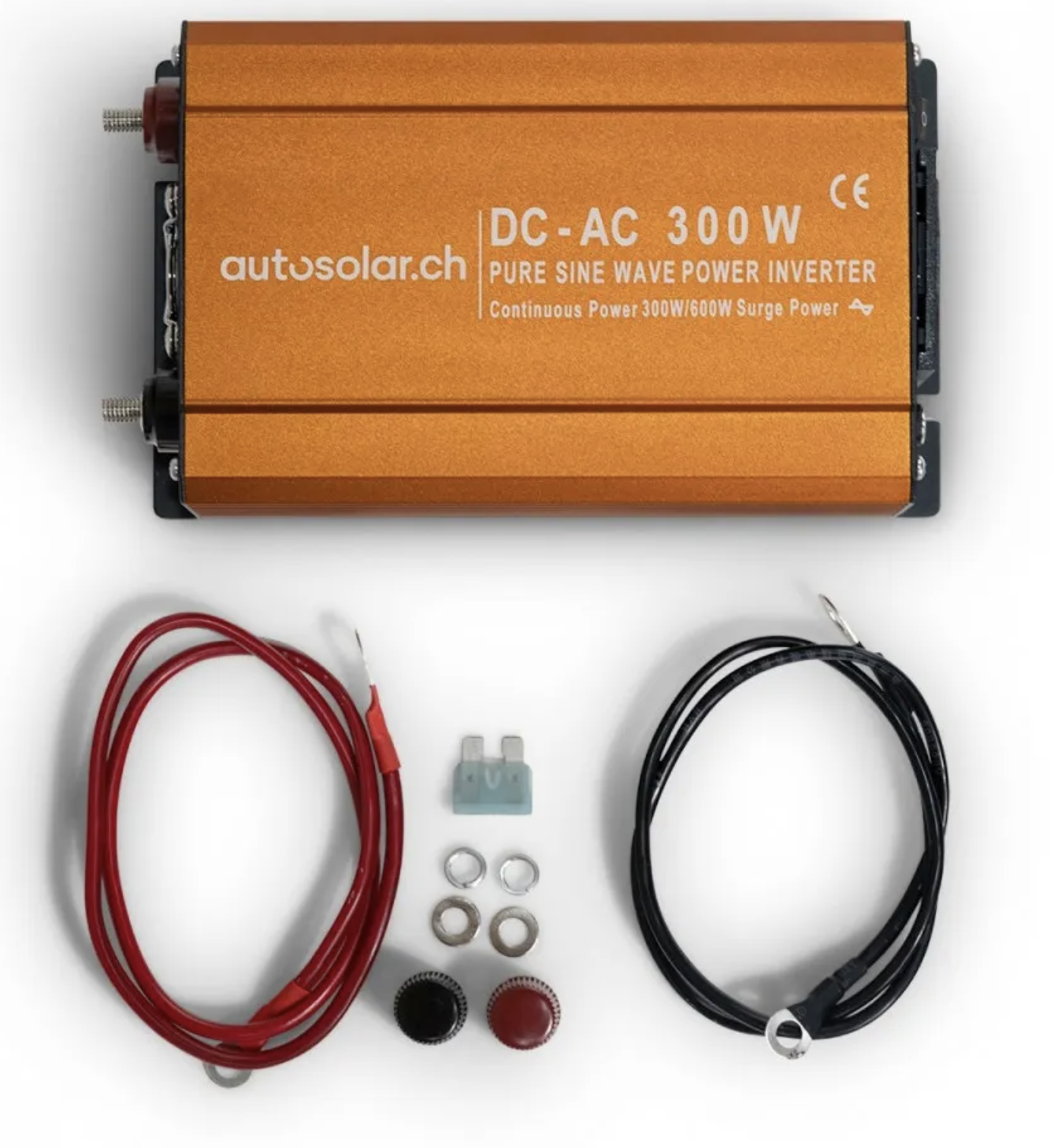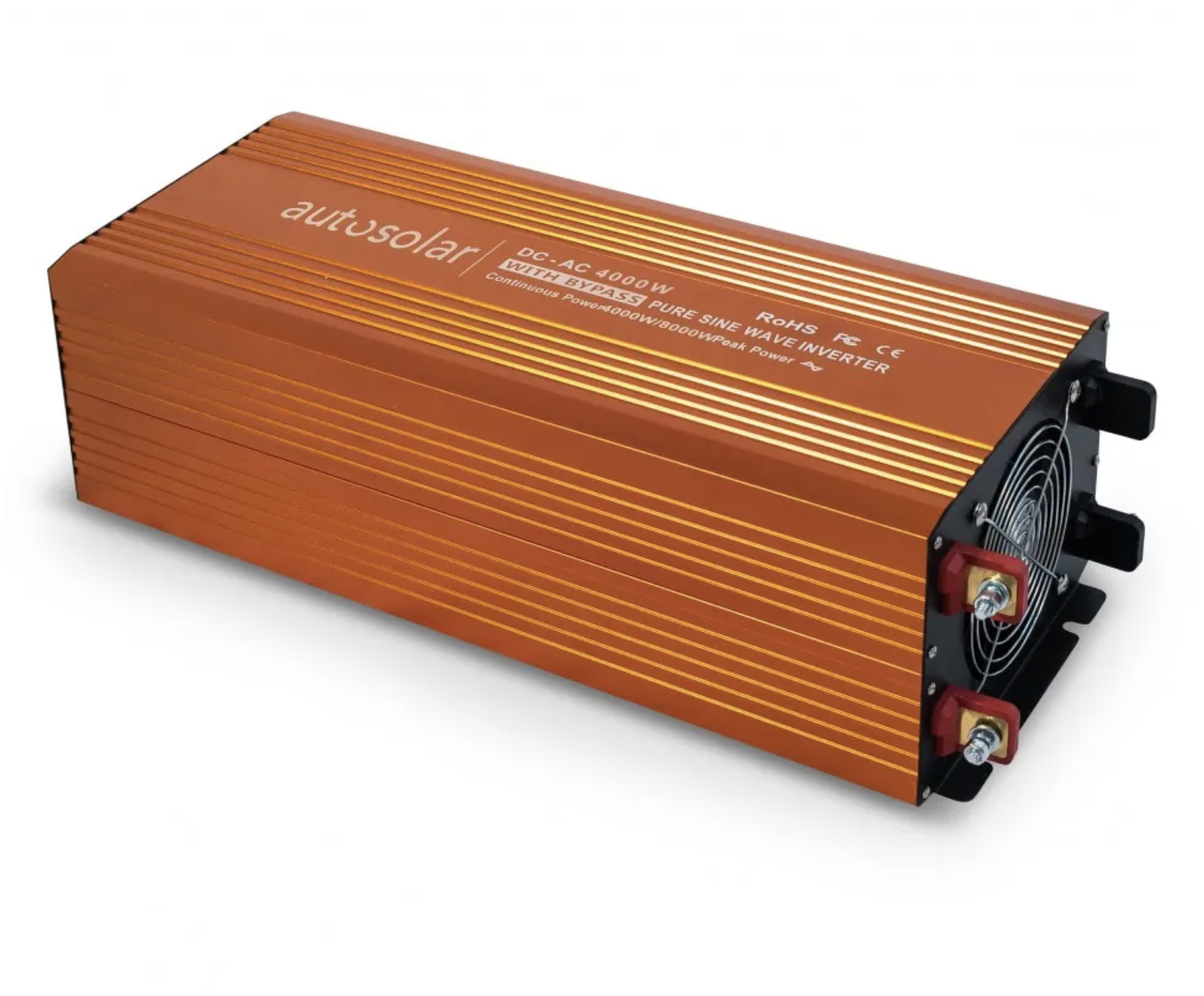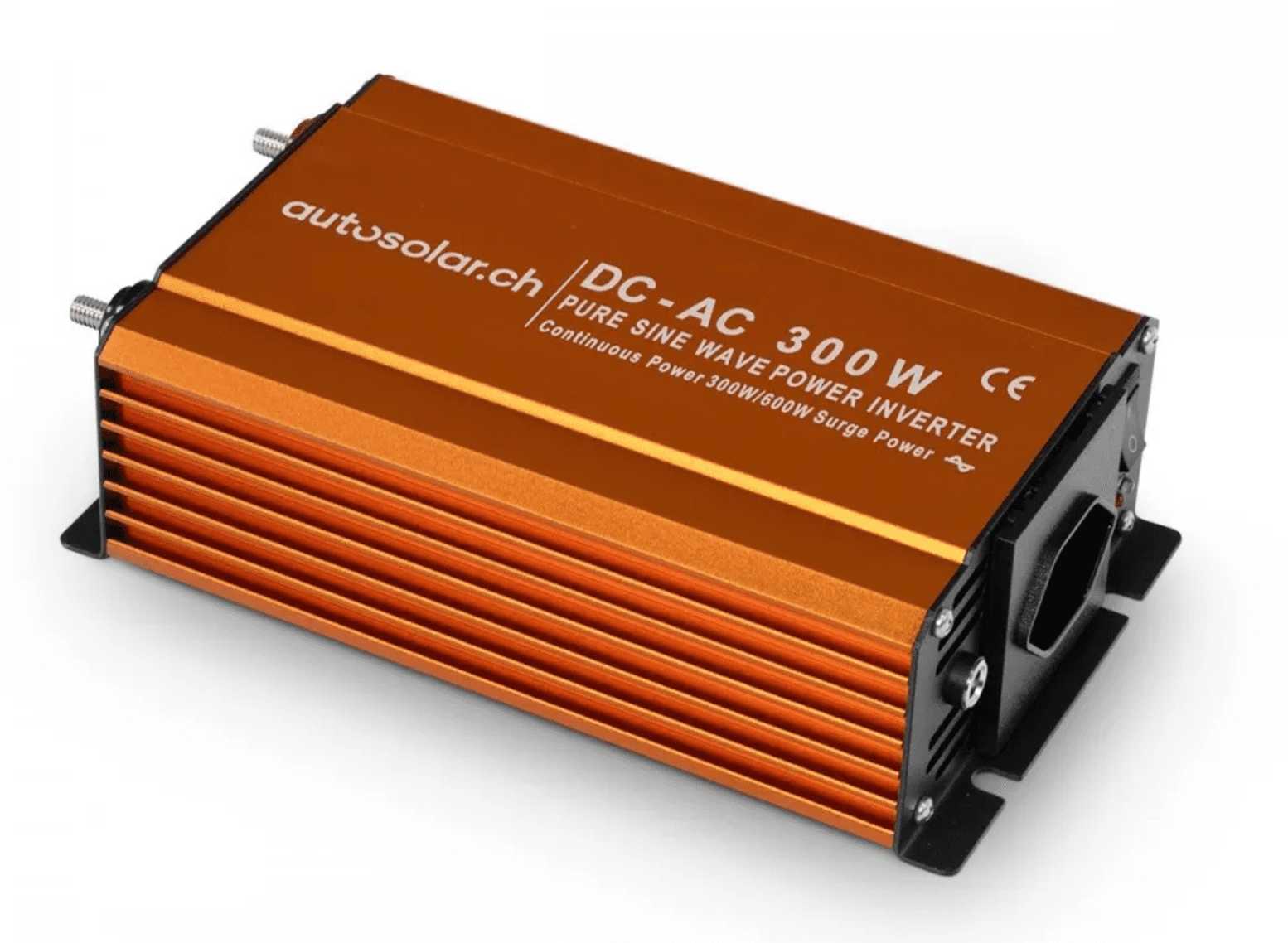Table of contents
- 1. What is an inverter?
- 2. Pure sine wave inverter vs. modified sine wave inverter
- 3. Selection Criteria for Inverters
- 4. Advantages and disadvantages of inverters
- 5. Inverter in RV or boat
- 6. Frequently Asked Questions (FAQs)
- 7. Conclusion
1. What is an inverter?
An inverter is an electronic device that converts direct current (DC) from solar panels or batteries into alternating current (AC) required for the operation of common household appliances and electronics. Inverters are an important part of solar and battery systems and ensure that the energy generated can be used efficiently and safely. To put it simply: an inverter is like a translator who understands two different languages. Direct current (DC) is one language and alternating current (AC) is another. The battery or solar panel "speaks" DC, while the home appliances understand "AC". The inverter acts as a translator that converts the DC language into the AC language so that the home appliances and the DC can communicate with each other.


Image: From small to large, from 300W to 5000W, there are various inverters on offer.
2. Pure sine wave inverter vs. modified sine wave inverter
There are two main types of inverters: pure sine wave inverters and modified sine wave inverters . Pure sine wave inverters produce a clean, sinusoidal alternating current that is very similar to the electricity from the public grid and from your home. This type of inverter is particularly suitable for sensitive electronic devices and offers better performance and efficiency.
Modified sine wave inverters, on the other hand, produce a less clean, "stepped" AC power that is adequate for some devices but may not be suitable for sensitive or demanding applications. They are usually cheaper, but also less efficient than pure sine wave inverters.
Image: Differences in the sine curves of the 230V output of inverters: on the left a modified sine wave, on the right the pure sine wave as it is produced with pure sine waves in AutoSolar inverters. In the middle an image of a trapezoidal sine wave.
3. Selection Criteria for Inverters
- Power: The power of the inverter should match the total power of the connected devices. Also note possible top performances. For example, a 2000W inverter should be used for a coffee maker that draws 1500W.
- Voltage: The input voltage of the inverter must match the voltage of your batteries (e.g. 12V, 24V or 48V).
- Sine Wave Type: Choose a pure sine wave inverter for sensitive electronics or a modified sine wave inverter for less demanding applications. We always recommend using pure sine wave inverters, as you are on the safe side and your devices are not damaged.
- Bypass function: Bypass inverters allow automatic switching between battery power and grid power without the need for manual switching.
- Efficiency: An efficient inverter reduces energy losses and maximizes the use of the solar energy produced. All AutoSolar inverters are highly efficient and have a high efficiency.
 A 2000W inverter should be used for larger consumers such as a coffee machine or kettle.
A 2000W inverter should be used for larger consumers such as a coffee machine or kettle. 
4. Advantages and disadvantages of inverters
Advantages:
- Allow the use of solar energy to power household appliances and electronics
- Offer a clean, stable power supply (especially with pure sine wave inverters)
- Can be used in RVs, boats and off-grid applications
- Are available in different power classes and voltages
Disadvantages:
- Cost and efficiency vary depending on the type and quality of the inverter
- Modified sine wave inverters can be unsuitable for sensitive electronics
- Some inverters can work less efficiently in high temperatures or unfavorable conditions
5. Inverter in RV or boat
Inverters are an important component for solar systems in mobile homes and boats. They allow you to use the energy generated by solar panels to power home appliances and electronics. When using inverters in mobile homes or boats, you should pay attention to the following factors:
- -Choose an inverter that provides enough power for your devices
- -Make sure the voltage is correct (e.g. 12V or 24V) and a suitable sine wave type
- -Make sure the inverter is efficient and reliable to get the most out of the solar energy
- -Use bypass inverters to automatically switch between battery and grid power when available
- -Make sure that the inverter is installed correctly and securely
6. Frequently Asked Questions (FAQs)
- How is an inverter connected to the solar system?
- An inverter is usually connected directly to the battery. The exact connection may vary depending on the application and inverter type. It is important that the connection between the battery and the inverter is as short as possible so that the high currents heat up the cables less.
- Can you operate a mobile photovoltaic system without an inverter?
- Yes, it is possible to run a mobile photovoltaic system without an inverter, but only if you use DC devices or use a DC distributor. When using AC devices, such as a coffee maker or a laptop, an inverter is required to convert the DC voltage from the solar panels to AC voltage.
- What does the inverter do at night?
- At night, when no solar energy is being generated, the inverter usually does not switch off, but takes the required power from the battery. When the sun is shining, the inverter takes the required energy directly from the solar modules and, if necessary, supplements it with energy from the battery.
- Where do you attach the inverter?
- The inverter should be installed in a well-ventilated, dry place near the batteries. Make sure that the inverter is protected from direct sunlight, moisture and extreme temperatures. When mounting on a wall, the inverter should be mounted vertically to ensure the best possible airflow.
- Can you feed into the socket?
- Feeding solar power into the public grid requires a grid-connected inverter, such as our balcony power plant microinverter. In Switzerland, a feed-in of up to 600W per household is possible without a permit.
7. Conclusion
Inverters are an essential part of solar panels and battery systems, especially in RVs and boats. Choosing the right inverter depends on various factors such as power, voltage and sine wave type. At AutoSolar you will find a wide range of pure sine wave inverters , modified sine wave inverters and accessories to meet your individual needs. We also offer lithium batteries , AGM batteries and mounting material for your solar system.
Visit our website to learn more about our products and find your perfect complete solar package for your RV, boat or off-grid. If you have any questions or would like more information, you are welcome to call us on 044 999 01 01 or send us an email .
author
Written by Till - An expert in solar technology and inverters with many years of experience in solar energy for mobile solar systems. Follow Till on LinkedIn for more information and updates on solar technology and renewable energy.















